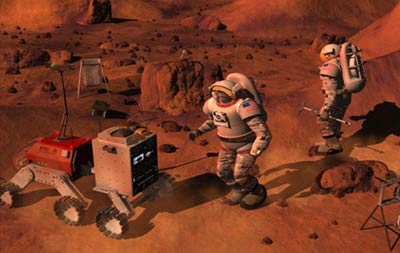Can’t all space nerds get along?by Michael Huang
|
| What would a non-zero-sum future look like? More joint activities between the interest groups would be a good beginning. |
Zero-sum games also exist in space politics. Pro-science vs. anti-science, pro-human vs. anti-human, and pro-private vs. anti-private are debates where gains by one side equal losses by the other. As a participant in the human spaceflight debate, my personal impression is that the anti-human group has particularly extreme viewpoints. Calls for the elimination of human spaceflight regularly appear in space opinion articles, so much so that it has become a tired cliché of the field. It is impossible to reach a compromise in a zero-sum game where one side wants something to exist and the other side wants it eliminated. Hopefully the pro-science, pro-human and pro-private groups will all win their respective zero-sum games and we can stop playing them.
What would a non-zero-sum future look like? More joint activities between the interest groups would be a good beginning. An issue like better launch technology is of common interest to robotic, human, and private spaceflight. The various space societies could also cooperate on membership. Space enthusiasts rarely join all the space societies because it means filling out several application forms and paying multiple fees. The societies could offer a joint membership or establish an umbrella organization. Not only would the societies benefit from increased membership, but the members would have access to a wider range of space projects and viewpoints.
The non-zero-sum game could also be applied to that other great topic in space politics: space and Earth. Again, there is nothing inconsistent with supporting valuable projects both on Earth and in space. People who try to portray space and Earth as a zero-sum debate usually have an anti-space agenda in mind. Like its counterparts, pro-space vs. anti-space is a zero-sum game which should be won and ended. It’s fitting that the pro-space side would be best served by a united political coalition.
